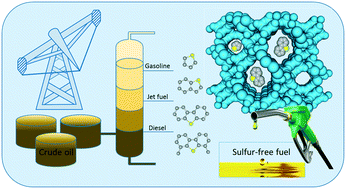Adsorptive desulfurization of liquid hydrocarbons using zeolite-based sorbents: a comprehensive review
Abstract
Sulfur removal from transportation fuels is essential for maintaining a pollutant-free environment and ensuring a healthy living. While hydrodesulfurization (HDS) has been the state-of-the-art solution for sulfur reduction in fuels, the technology is characterized by high energy and cost consumption, and it is ineffective for the removal of heavy sulfur molecules, such as alkyl-dibenzothiophenes. For this reason, alternative technologies such as oxidative desulfurization, extractive desulfurization, biodesulfurization and adsorptive desulfurization are studied. Among these, adsorptive desulfurization (ADS) represents a promising alternative method of removing sulfur by adsorption under ambient conditions. The lifetime, selectivity and capacity of ADS highly depend on the type of sorbent used. Among the many sorbents studied, Y zeolites have shown to be excellent candidates for such application. Y zeolites have a unique pore structure, large surface area and available acid sites, all of which are beneficial for the adsorption of sulfur molecules. Moreover, the structure of Y zeolites is easily tunable; thus mesoporosity and metal cations can be incorporated in the structure and increase sulfur capacity and selectivity. Two types of adsorption mechanisms have been identified, namely π-complexation and direct S–M interaction. The biggest challenge with the ADS technology is the selective adsorption of refractory sulfur compounds in the presence of aromatics/olefins, since these compounds exhibit similar structure and adsorption energies. This review focuses on past and recent ADS studies using various modified zeolites to meet federal sulfur specifications for transportation fuels, such as gasoline, jet fuel and diesel, without compromising the quality of the fuels. The most effective sorbents utilize the synergy of bimetals as a means to increase adsorption selectivity and capacity, leading to higher sulfur uptake. In the deep desulfurization region, which involves refractory sulfur compounds, mesoporous Y zeolites have shown promise in higher sulfur capacity by overcoming diffusion limitations. Hence, many studies in the recent literature have demonstrated that ADS using Y zeolites can be a promising desulfurization technology, which can work either as a stand-alone process or complimentary to the HDS process.



 Please wait while we load your content...
Please wait while we load your content...